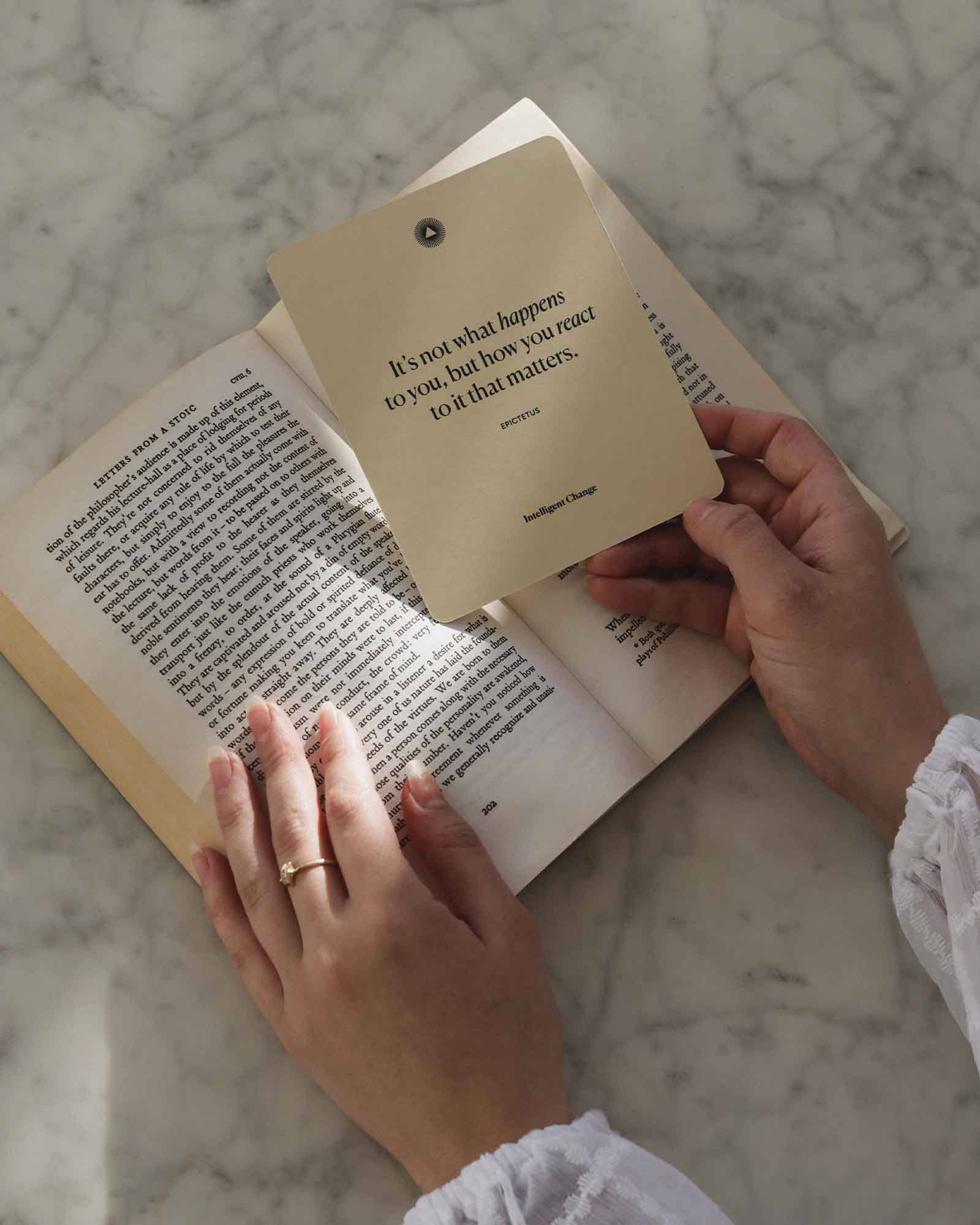The Art of Life According to Ancient Stoic Philosophers
by Kinga Lewandowska
Since the dawn of time mankind has posed difficult questions concerning the nature of our existence. The moment our abstract brains developed enough to wake us up in the middle of the night in order to overthink the simplest matters, we have been inquisitive and analytic. In ancient times of great enlightenment we began to systematize our discoveries, theories and ideas into a coherent discipline.
Philosophy has become the domain of thinkers, the curious ones and those of us who seek to understand the reality we live in on a deeper level. As the etymological core of the word philosophy is “the love of wisdom”, this discipline has been typically associated with dusty libraries filled with old books to the brim. However, philosophy is as relevant today as it was millennia ago.
How does one become a philosopher?
Through long years of study, but only if you want to be a scholar and a philosopher by profession. The truth is, philosophy isn’t only reserved for bearded sages in temples or college professors. It is as accessible and relevant in our everyday reality as it is at universities. In fact, you can start applying philosophical assumptions to your life as we speak.
The school of thought that is both closest to our hearts at Intelligent Change and has the most practical application of its principles is stoicism. Let us explore bits of stoic wisdom together.
The Stoic path to eudaimonia
There is much more to stoicism than the well-known stoic calm (very often unfairly described as mere emotionlessness). Created by Zeno of Citium in Athens in the 3rd century BC, stoicism is the philosophy of tranquillity, equanimity and virtue. Maybe names like Marcus Aurelius, Epictetus or Seneca also ring a bell? What could a Roman emperor, former slave and dramatist have in common, you ask? All of them shared the same outlook on life that values practical wisdom, courage, justice and temperance as signposts to wellbeing.
Begin at once to live, and count each separate day as a separate life. – Seneca
Focus on what you can control
Stoics talk about the dichotomy of control, which basically means that some things are up to us and some are not. If it’s under your control – act, if it isn’t – let it go. For example, being stuck in a traffic jam – what a test for your patience. Yet, you’re motionless in a long line of cars, why not use this time to press pause in your mind and breathe. Try to distance yourself from the stressful situation and evaluate: is it worth straining your precious nervous system for something so far outside of your control?
The stoics advise to cease the moment, sit back, and admire the here and now. “For every minute you are angry, you lose sixty seconds of happiness”, said Ralph Waldo Emerson. As counterintuitive as it might seem, life is too short not to enjoy being stuck in a traffic jam.
We suffer not from the event in our lives, but from our judgement about them. – Epictetus
The obstacle is the way
The stoics are masters of overcoming adversity. The secret lies in their positive approach to challenging situations. When Zeno of Citium lost his ship with all its cargo, he could have easily given in to despair, he lost everything. Instead, he ended up in Athens, discovered philosophy and started his own school of thought (and that was the beginning of stoicism).
I judge you unfortunate because you have never lived through misfortune. You have passed through life without an opponent—no one can ever know what you are capable of, not even you. – Seneca
Sooner or later, we all encounter bumps in the road, they’re unavoidable. According to stoics, we should not only accept that there’s nothing we can do about hardship, we should be grateful for it as it shapes and fortifies our character. As Epictetus underlines, without the lion, hydra, stag or boar there would be no Hercules as we know him today. In the absence of challenges the mighty warrior would have rolled over in bed and snore his life away, forgotten by history.
What stands in the way becomes the way. – Marcus Aurelius
Dance like there’s no tomorrow
The stoics think about death often. One of their most popular maxims is memento mori – remember that you will die. The adage is not supposed to scare you into depression or anxiety but rather serve as a reminder to cherish and appreciate every minute, to mindfully live in the present moment and treat everything and everyone as a gift. Fill your days with kindness, joy and excitement. Whatever you want to do tomorrow but can be done today, do it today. Wake up, open your eyes and live fully, live intentionally, there’s only today. Seneca points out, “when a man has said: 'I have lived!', every morning he arises he receives a bonus.”
Do this thing in front of you as if it is the last thing you are doing in your life. – Marcus Aurelius
Plan and review your day
“I will keep constant watch over myself and – most usefully – will put each day up for review”, said Seneca, who, similarly to Epictetus and Marcus Aurelius, kept a journal. In stoicism, journaling equals practicing philosophy. The benefits of putting pen to paper are many. It is a practical way to preserve acquired wisdom, plan ahead or reflect on the events of a day coming to an end. Journaling is a spiritual exercise that will help you process thoughts, feelings, memories and ideas, even if it’s in three sentences a day. To keep the contents of your mind and heart written down and at hand is the stoic way to self-awareness and wisdom.
Our life is what our thoughts make it. — Marcus Aurelius
It’s all in your mind
Journaling will also help you keep your reactions in check, which is one of the cardinal rules of stoicism. “Not to display anger or other emotions, yet be full of love”, mused Marcus Aurelius. The goal isn’t to wash off all your feelings, but to focus on the good and positive ones. What happens outside of your body and mind is beyond your control, yet what you choose to direct your attention and energy towards is completely up to you. The power is within you.
You become what you give your attention to… If you yourself don’t choose what thoughts and images you expose yourself to, someone else will. — Epictetus
The well-being of the bee
The stoic way is to use your gifts and talents to support others on their journey. According to Marcus Aurelius, “that which isn’t good for the hive, isn’t good for the bee.” We are all connected. The wellbeing of an individual is dependent on the wellbeing of the tribe and vice versa. It starts with you. Take care of yourself first and remember that “the mind must be given relaxation – it will rise improved and sharper after a good break”, as Seneca underlined. Disconnect and rest. Only then will you be able to provide value and take care of the hive.
Wellbeing is realized by small steps but it’s no small thing. – Zeno
It’s all Greek to me
To this day, stoicism remains one of the most important schools of thought, its wisdom being invaluable to ars vitae. Stoic lessons on how to be mindful, of value to others and emotionally resilient to misfortune can change your life. We believe that with this article we’ve managed to spark your interest and we encourage you to explore further.
By all means, for an ultimate experience, visit a dusty old library with thick volumes. Sit in silence and meditate as the Greeks did back in the day. It is entirely possible that you’ll feel inspired enough to start your own school of philosophy, or question your current beliefs and instill positive change into your thought processes, affirmations and values.
Life is very short and anxious for those who forget the past, neglect the present, and fear the future. – Seneca
Ready to transform your mindset with powerful, daily quotes? Stoic Reminders quote cards have just launched. Display a Stoic Reminders quote card on your desk or by your bed, and let their wise words bring you back to what's important—your peace, your balance, your strength.









